
Sidi El Houari: A Blend of History and Culture in Oran
Sidi El Houari is one of Oran's oldest and most charming neighborhoods. Nestled in the heart of this bustling Algerian city, Sidi El Houari offers visitors a unique glimpse into the region's rich history and vibrant culture. The area is characterized by its narrow, winding streets, historic buildings, and a palpable sense of history that dates back to the Spanish and Ottoman eras. One of the main attractions in Sidi El Houari is the Santa Cruz Fort, perched on a hill offering panoramic views of Oran and the Mediterranean Sea. The fort is a testament to the neighborhood's historical significance and is a must-visit for history enthusiasts. Another highlight is the Bey's Palace, a stunning example of Ottoman architecture that provides insight into the lavish lifestyle of past rulers. As you wander through Sidi El Houari, you'll encounter a variety of local shops, cafes, and street vendors selling traditional Algerian crafts and cuisine. The neighborhood is a fantastic place to experience the local way of life, with its lively markets and friendly residents. Don't miss the chance to try some local delicacies, such as Mhadjeb (stuffed flatbread) and Makroud (a sweet pastry made with dates and almonds). Sidi El Houari is also home to several cultural and religious sites, including the Great Synagogue of Oran and the Pasha Mosque. These landmarks not only showcase the area's diverse heritage but also offer peaceful retreats from the bustling streets. Whether you're a history buff, a culture enthusiast, or simply looking to explore a different side of Oran, Sidi El Houari is a neighborhood that promises to captivate and inspire.
Local tips in Sidi El Houari
- Wear comfortable walking shoes as the streets are narrow and often uneven.
- Visit the Santa Cruz Fort early in the morning to avoid crowds and enjoy the best views.
- Carry some local currency as many small shops and vendors do not accept credit cards.
- Take time to interact with the locals; they are often willing to share fascinating stories about the neighborhood's history.
- Don't forget your camera; Sidi El Houari offers countless photo opportunities with its historic architecture and scenic views.
Sidi El Houari: A Blend of History and Culture in Oran
Sidi El Houari is one of Oran's oldest and most charming neighborhoods. Nestled in the heart of this bustling Algerian city, Sidi El Houari offers visitors a unique glimpse into the region's rich history and vibrant culture. The area is characterized by its narrow, winding streets, historic buildings, and a palpable sense of history that dates back to the Spanish and Ottoman eras. One of the main attractions in Sidi El Houari is the Santa Cruz Fort, perched on a hill offering panoramic views of Oran and the Mediterranean Sea. The fort is a testament to the neighborhood's historical significance and is a must-visit for history enthusiasts. Another highlight is the Bey's Palace, a stunning example of Ottoman architecture that provides insight into the lavish lifestyle of past rulers. As you wander through Sidi El Houari, you'll encounter a variety of local shops, cafes, and street vendors selling traditional Algerian crafts and cuisine. The neighborhood is a fantastic place to experience the local way of life, with its lively markets and friendly residents. Don't miss the chance to try some local delicacies, such as Mhadjeb (stuffed flatbread) and Makroud (a sweet pastry made with dates and almonds). Sidi El Houari is also home to several cultural and religious sites, including the Great Synagogue of Oran and the Pasha Mosque. These landmarks not only showcase the area's diverse heritage but also offer peaceful retreats from the bustling streets. Whether you're a history buff, a culture enthusiast, or simply looking to explore a different side of Oran, Sidi El Houari is a neighborhood that promises to captivate and inspire.
Iconic landmarks you can’t miss
Bey's Palace
Explore Bey's Palace in Oran, a national heritage site showcasing Ottoman and Moorish architecture, and immerse yourself in Algeria's rich history.
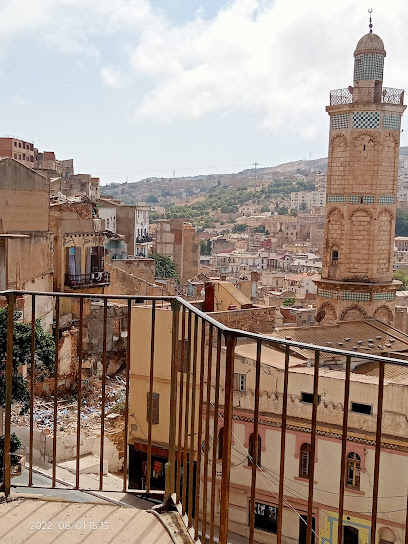
Ahmed Zabana National Museum
Explore Algeria's history, art, and natural wonders at Oran's Ahmed Zabana National Museum, a tribute to a national hero.
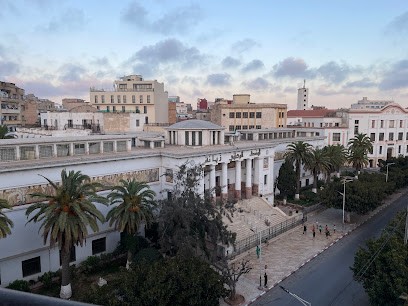
جمعية صحة سيدي الهواري
Explore Oran's cultural heart at جمعية صحة سيدي الهواري, where heritage, art, and community converge for an unforgettable experience.
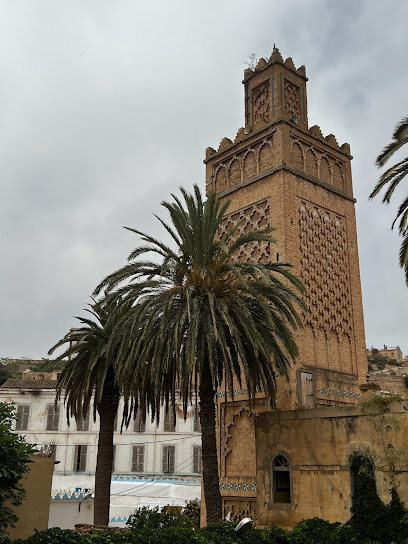
Sidi M'hamed garden
Escape to the heart of Oran at Sidi M'hamed Garden, a lush oasis offering tranquility, natural beauty, and a vibrant glimpse into local Algerian culture.
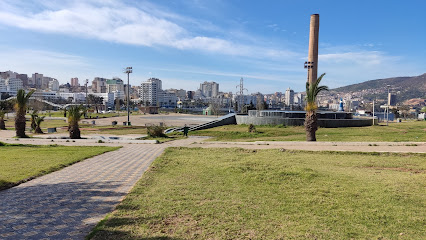
Porte du Santon
Discover the historical charm of Porte du Santon in Oran, a landmark offering a glimpse into the city's rich cultural heritage and architectural past.
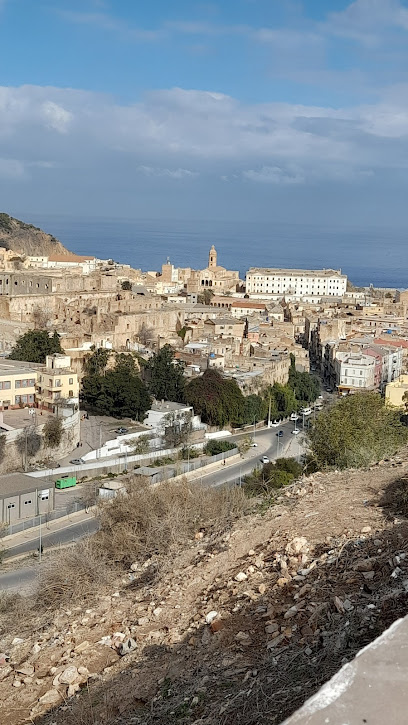
Municipality of Sidi El Hawari
Explore Sidi El Hawari, Oran: a historic district blending Berber roots, Spanish & Ottoman influences, and Algerian heritage. A cultural crossroads!
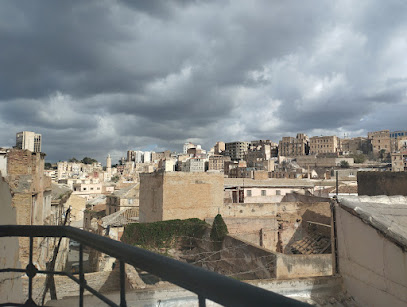
Kiosque à musique
Discover Oran's Kiosque à Musique, a historical landmark where music and culture once flourished in the heart of Sidi El Houari.

the Mausoleum of Sid El Houari,
Discover the serene Mausoleum of Sid El Houari in Oran, a spiritual and architectural gem honoring the city's patron saint.

Essential places to dine
El Firdaous
Experience authentic Algerian cuisine at El Firdaous in Oran - a must-visit destination for food lovers.
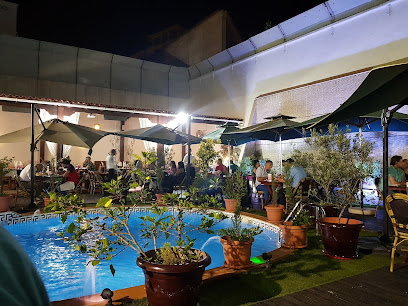
Resturant Bab El Hara
Savor authentic Algerian cuisine at Restaurant Bab El Hara in Oran—where every dish tells a story of rich cultural heritage.
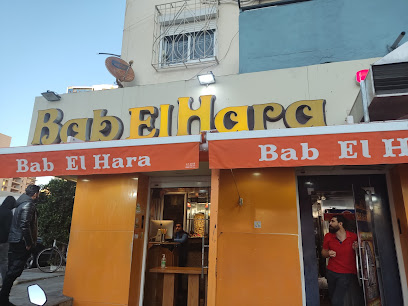
مطعم الباي
Discover authentic Algerian cuisine at مطعم الباي in Oran – a perfect blend of tradition and taste.
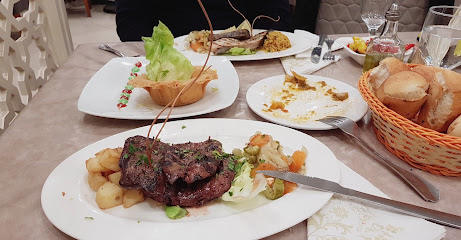
Pecherie la CONFIANCE
Experience authentic Algerian seafood at Pecherie la CONFIANCE in Oran - where freshness meets tradition.
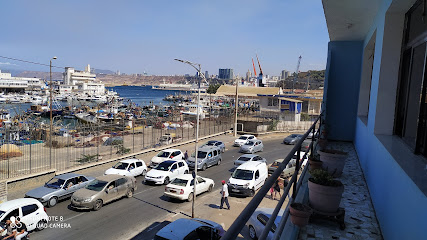
Restaurant Patus
Experience authentic Italian cuisine at Restaurant Patus in Oran – where every meal feels like a trip to Italy.
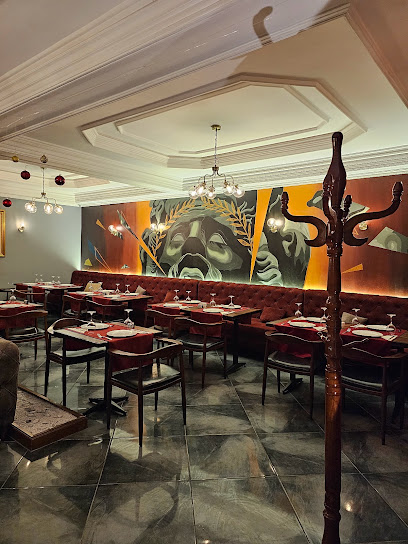
Le modjo lounge
Discover Le Modjo Lounge in Oran - A vibrant restaurant offering local flavors and international cuisine amidst an inviting atmosphere.
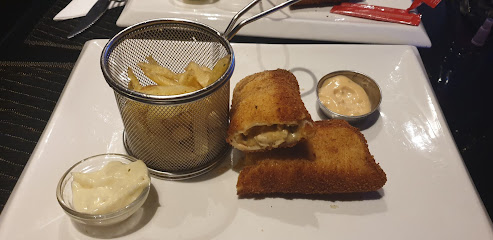
Restaurant Bab Al Hind
Experience authentic Indian flavors at Restaurant Bab Al Hind in Oran - where every dish tells a story of tradition and taste.
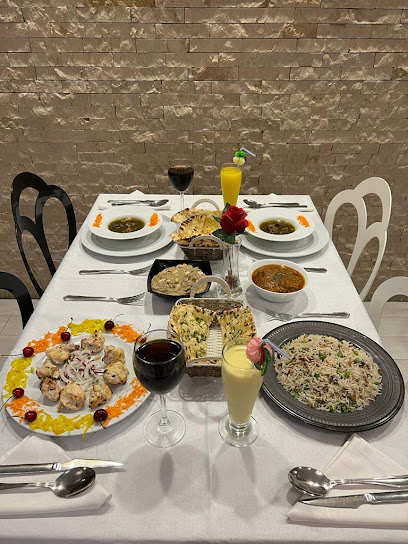
Restaurant traditionnel El foursane ( خيمة الفرسان)
Discover authentic Algerian flavors at El Foursane Restaurant in Oran - a true culinary gem reflecting local traditions.
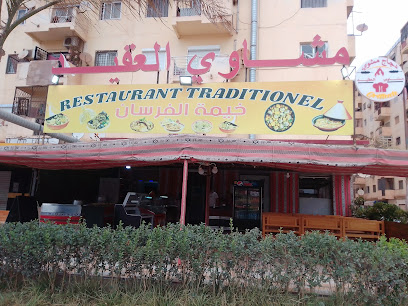
Houari restaurant
Experience authentic Algerian flavors at Houari Restaurant in Oran – where every dish tells a story.
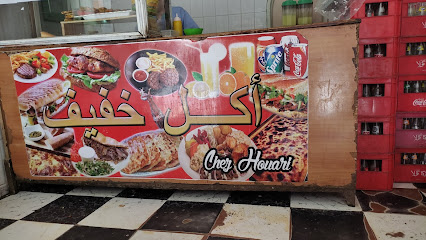
restaurant مطعم بيت الهواء
Experience authentic Algerian flavors at مطعم بيت الهواء in Oran - where tradition meets taste.

Markets, malls and hidden boutiques
Pritop
Explore the vibrant fashion scene at Pritop in Oran, offering a wide range of stylish clothing and accessories for every taste.
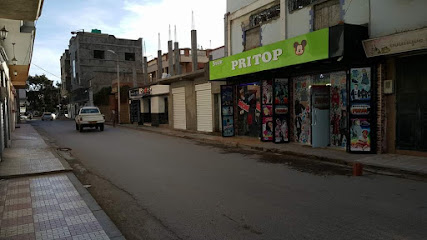
Centre Commercial Sidi Yahia
Explore the bustling Centre Commercial Sidi Yahia in Bir El Djir for a unique shopping and dining experience in Algeria.
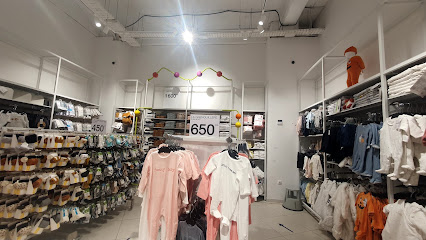
وهران الجزائر
Discover the vibrant culture, historical treasures, and stunning coastal views of Oran, Algeria, a must-visit destination for every traveler.
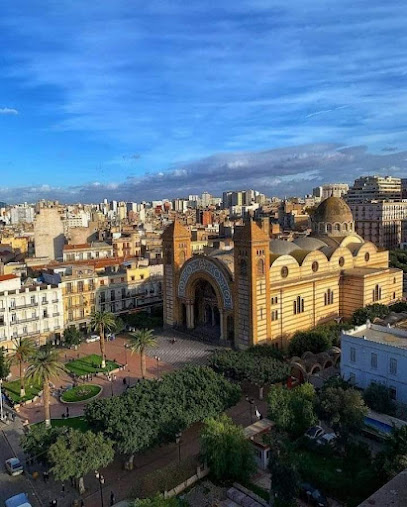
Boutique Torino Luxury
Explore Boutique Torino Luxury in Oran, your go-to destination for stylish and high-quality children's clothing in a chic shopping environment.
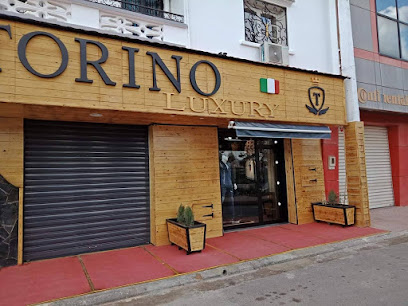
Galaxy deco
Explore Galaxy Deco in Oran for exquisite home goods and unique decor items that capture the essence of Algerian craftsmanship.
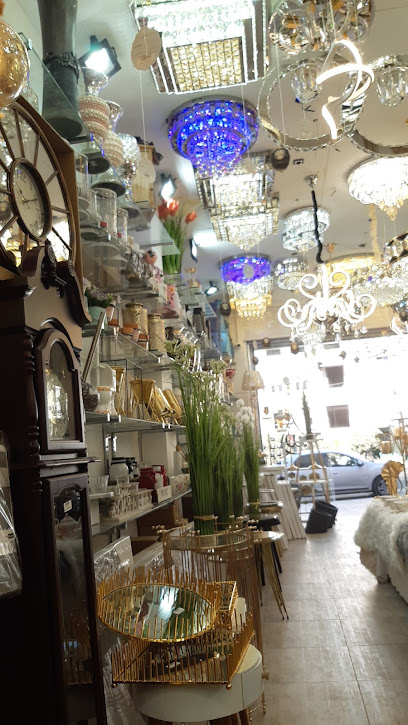
Houari x5
Explore Houari x5: A premier outlet store in Bir El Djir offering a unique shopping experience with local and international brands at unbeatable prices.
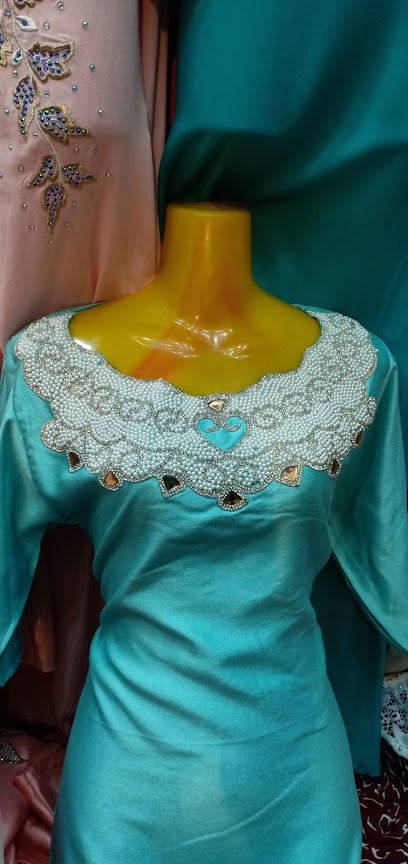
Boutique SR
Discover Boutique SR in Oran, a delightful children's clothing store offering stylish and affordable apparel for your little ones.

Houari ORAN
Explore the colorful offerings of Houari ORAN, where local culture meets shopping in the heart of Ben Aissa, Algeria.

Houari Shop
Explore the organic food haven of Houari Shop in Oran for fresh produce and health-focused specialties that celebrate local flavors.

Boutique intense31
Discover the heart of Algerian craftsmanship at Boutique Intense31, where unique gifts await your exploration in Bir El Djir.
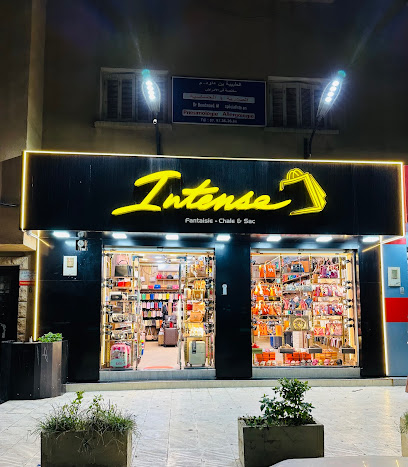
Local Phrases
-
- Helloمرحبا
[marhaban] - Goodbyeوداعا
[wadaean] - Yesنعم
[naam] - Noلا
[laa] - Please/You're welcomeمن فضلك
[min fadlik] - Thank youشكرا
[shukran] - Excuse me/Sorryعذرا
[aaziran] - How are you?كيف حالك؟
[kayfa haluk?] - Fine. And you?بخير. وأنت؟
[bikhayr. wa anta?] - Do you speak English?هل تتحدث الإنجليزية؟
[hal tatahadath al'inglizia?] - I don't understandلا أفهم
[laa afham]
- Helloمرحبا
-
- I'd like to see the menu, pleaseأريد أن أرى القائمة، من فضلك
[urid an ara alqaimah, min fadlik] - I don't eat meatأنا لا آكل اللحم
[ana la aakul allahm] - Cheers!في صحتك!
[fi sahtak!] - I would like to pay, pleaseأريد أن أدفع، من فضلك
[urid an adfaa, min fadlik]
- I'd like to see the menu, pleaseأريد أن أرى القائمة، من فضلك
-
- Help!النجدة!
[alnajdah!] - Go away!اذهب بعيدا!
[idhab baeidan!] - Call the Police!اتصل بالشرطة!
[iitisil bialshurta!] - Call a doctor!اتصل بطبيب!
[iitisil batabib!] - I'm lostلقد ضللت
[laqad dalalt] - I'm illأنا مريض
[ana mariid]
- Help!النجدة!
-
- I'd like to buy...أريد أن أشتري...
[urid an ashtari...] - I'm just lookingأنا فقط أتفرج
[ana faqat atfarij] - How much is it?كم سعره؟
[kam siroh?] - That's too expensiveهذا غالي جدا
[hatha ghali jiddan] - Can you lower the price?هل يمكنك خفض السعر؟
[hal yumkinuk khafez alsiroh?]
- I'd like to buy...أريد أن أشتري...
-
- What time is it?كم الساعة؟
[kam alsaeah?] - It's one o'clockالساعة الواحدة
[alsaeah alwahidah] - Half past (10)الساعة والنصف (10)
[alsaeah walnisf (10)] - Morningالصباح
[assabah] - Afternoonبعد الظهر
[baed alzuhur] - Eveningالمساء
[almasa] - Yesterdayأمس
[ams] - Todayاليوم
[alyawm] - Tomorrowغدا
[ghadan] - 1واحد
[wahid] - 2اثنان
[ithnan] - 3ثلاثة
[thalatha] - 4أربعة
[arbaah] - 5خمسة
[khamsah] - 6ستة
[sittah] - 7سبعة
[sabah] - 8ثمانية
[thamania] - 9تسعة
[tasia] - 10عشرة
[ashara]
- What time is it?كم الساعة؟
-
- Where's a/the...?أين...
[ayn...] - What's the address?ما هو العنوان؟
[ma hu alunwan?] - Can you show me (on the map)?هل يمكنك أن تريني (على الخريطة)؟
[hal yumkinuk an tarini (ala alkhariata)?] - When's the next (bus)?متى يأتي الحافلة التالية؟
[mata yaati alhafilat altalia?] - A ticket (to ....)تذكرة (إلى ...)
[tadhkirah (ila ...)]
- Where's a/the...?أين...
History of Sidi El Houari
-
Sidi El Houari's history is deeply intertwined with the founding of Oran in the 10th century when it served as a vital port for the Berber kingdom of the Maghreb. The area was named after a local marabout, or religious figure, which reflects the Islamic influence that permeated the region. The neighborhood became a melting pot of cultures, attracting traders, scholars, and pilgrims from various backgrounds.
-
In the 16th century, Sidi El Houari was significantly influenced by Spanish colonization. The Spaniards fortified the area, constructing the historic Santa Cruz Castle overlooking the neighborhood. This period marked the introduction of European architectural styles and the establishment of a bustling trade hub, further enriching the cultural tapestry of Sidi El Houari.
-
During the 17th and 18th centuries, Sidi El Houari became part of the Ottoman Empire's coastal territories. The Ottomans left a lasting impact on the architecture and urban layout of the neighborhood. The construction of mosques and caravanserais during this period showcased the synthesis of local and Ottoman styles, illustrating the neighborhood's importance as a commercial and cultural center.
-
The French occupation beginning in 1830 transformed Sidi El Houari into a modern urban space. The French expanded the port and introduced new infrastructure, altering the traditional landscape. This era also saw the establishment of schools, hospitals, and public spaces, which contributed to the neighborhood's development as a vibrant community within Oran.
-
Sidi El Houari played a significant role during the Algerian War of Independence (1954-1962). The neighborhood witnessed intense political activity and protests against French colonial rule. Many residents participated in the struggle, and the area became a focal point for revolutionary ideas and actions, contributing to Algeria's eventual liberation.
-
Post-independence, Sidi El Houari has been a site for cultural resurgence. The neighborhood is known for its traditional crafts, music, and culinary heritage, reflecting the rich diversity of Oran's population. Efforts have been made to preserve its historical sites and promote local culture, making it a vital part of Oran's identity today.
Sidi El Houari Essentials
-
Sidi El Houari is easily accessible from other neighborhoods in Oran. The main public transport options include buses and taxis. From the city center, you can take bus lines 6 or 8, which will drop you near the entrance of Sidi El Houari. Alternatively, taxis are available and can be hired for a fixed fare; ensure to negotiate the price before starting your journey. If you're coming from the Oran Train Station, a short taxi ride will get you to Sidi El Houari in about 10 minutes.
-
Sidi El Houari is compact and best explored on foot, allowing you to soak in the rich history and architecture. Local buses also operate within the neighborhood, connecting you to nearby areas. Taxis are plentiful and reasonably priced, making them a convenient option for longer distances. Bicycle rentals are available from various shops, providing an eco-friendly way to explore the area.
-
While Sidi El Houari is generally safe for tourists, it is wise to remain cautious. Avoid areas that are poorly lit at night and be cautious in crowded markets or public transport. Petty crimes like pickpocketing can occur, particularly in tourist hotspots. It is advisable to stay vigilant around the waterfront promenade, especially after dark.
-
In case of an emergency, dial 19 for police assistance and 14 for fire services. For medical emergencies, the local hospital is located on the outskirts of Sidi El Houari. It's essential to have travel insurance that covers medical situations. Pharmacies are available for minor health issues, and many have staff who speak basic English.
-
Fashion: Do dress modestly, especially when visiting religious sites. Avoid wearing revealing clothing. Religion: Do respect local customs and traditions. Always cover your head when entering mosques. Public Transport: Do be polite and give up your seat for elderly passengers. Don’t eat or drink on public transport. Greetings: Do greet people with a handshake. Don't use your left hand for greetings or giving items, as it is considered impolite. Eating & Drinking: Do try local delicacies and accept food offerings graciously. Don’t refuse hospitality, as it is considered impolite.
-
To experience Sidi El Houari like a local, visit the vibrant markets where you can buy fresh produce and local handicrafts. Engage with locals, as they are often friendly and willing to share stories about the neighborhood's history. Don’t miss out on tasting traditional dishes at local eateries, and try to attend a local festival if your visit coincides with one, as it offers a glimpse into the culture and traditions of the area.
Nearby Cities to Sidi El Houari
-
Things To Do in Tlemcen
-
Things To Do in Oujda
-
Things To Do in Almeria
-
Things To Do in Murcia
-
Things To Do in Alicante
-
Things To Do in Algiers
-
Things To Do in Málaga
-
Things To Do in Valencia
-
Things To Do in Ronda
-
Things To Do in Chefchaouen
-
Things To Do in Gorham's Cave Complex
-
Things To Do in Catalan Bay
-
Things To Do in Europa Point
-
Things To Do in St. Michael's Cave
-
Things To Do in Moorish Castle









